Selections of fresh agricultural products under sunny skies. Cool summer breezes as you peruse a selection of seasonal fruits and vegetables. The people who grew the food right there before you, happy to answer any questions you may have. And a few extra surprises to discover, like a local musician performing nearby or the local library setting up a children’s craft.
These are just some of the ways farmers’ markets work to make getting your food an experience, not just an errand.
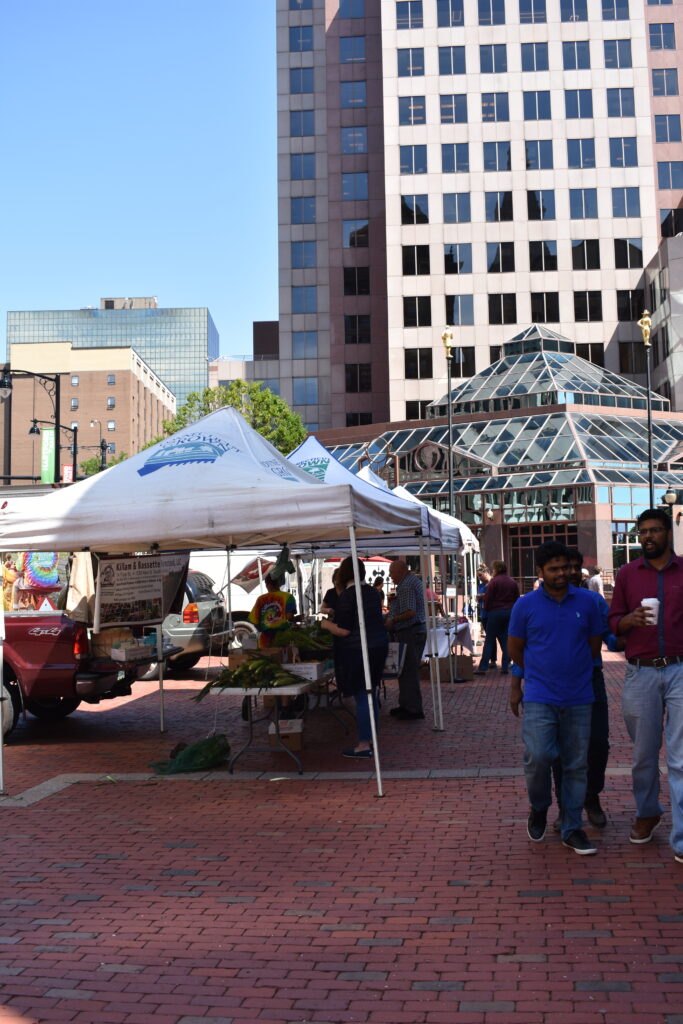
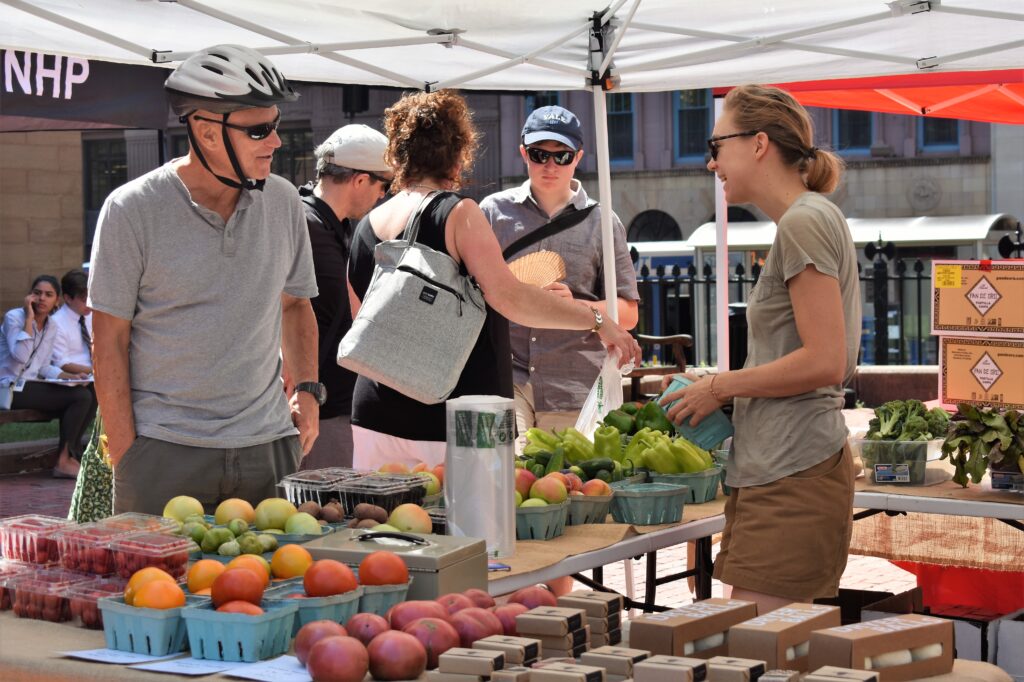
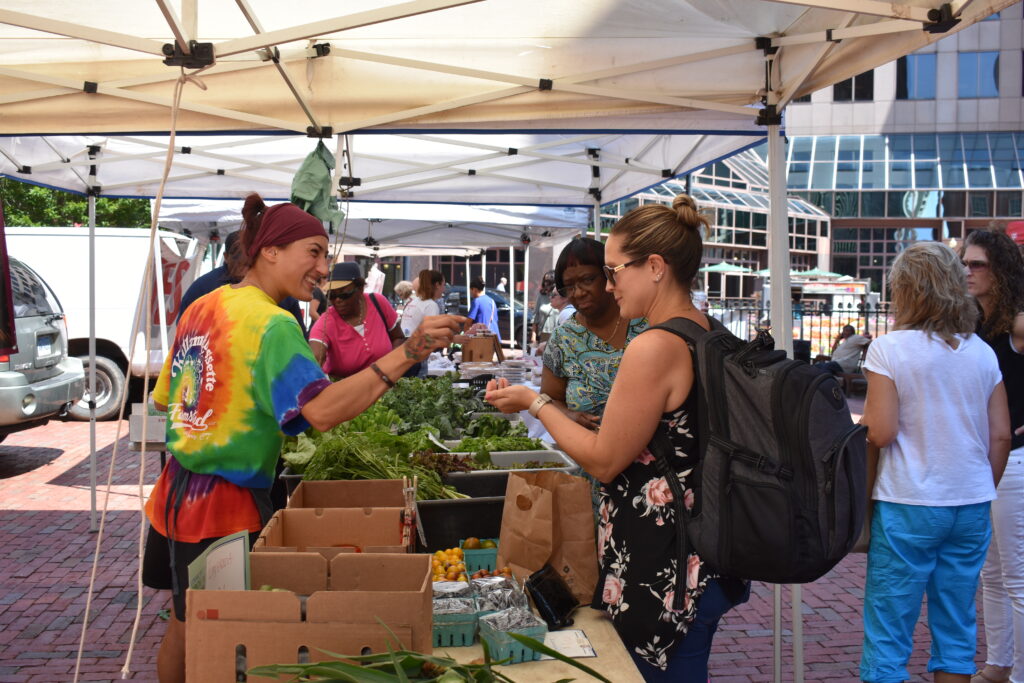
We previously discussed how CT Grown farmers’ markets offer a terrific opportunity to find new products, learn from local farmers, and find great deals on fresh, nutritious, locally grown food. They’re also a great way to connect with your community. Not only can you meet your local farmers, but also artisans, musicians, and representatives from nonprofit organizations.
Farmers’ markets are often held in venues that open the door to further exploration, such as beautiful parks or downtown areas that let you visit Main Street businesses. Purchases at a farmers’ market help keep your money close by, which strengthens the local economy overall.
Discover Connecticut farmers’ markets
Each farmers’ market has its own unique appeal, but this brief guide offers an overview of some of this year’s farmers’ markets in Connecticut and how they can be a destination for you and your family:
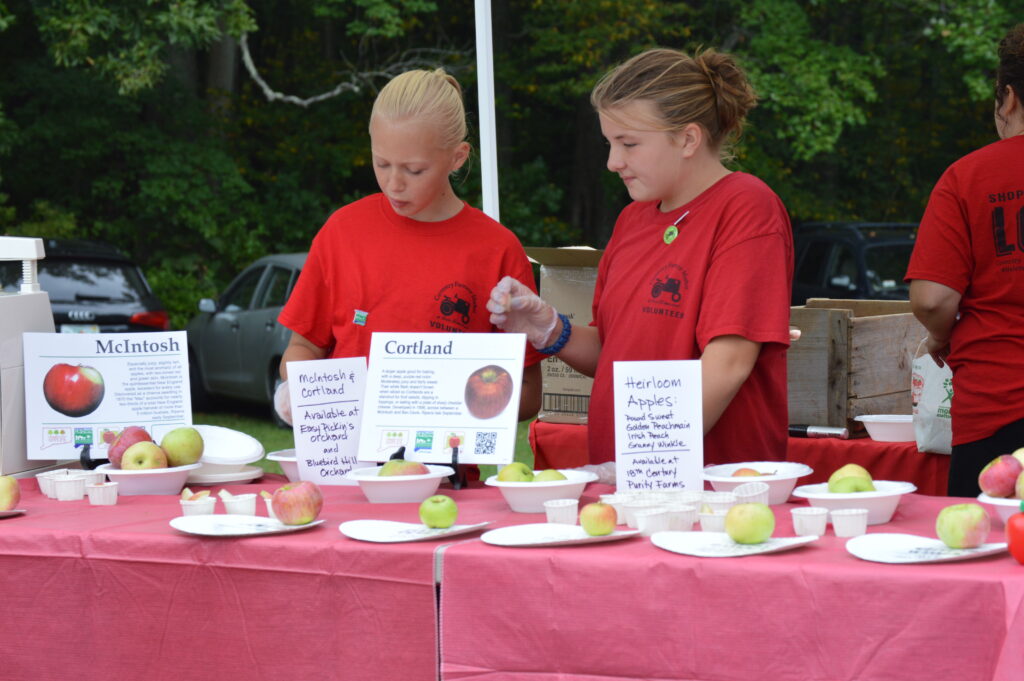
CitySeed Farmers Markets: CitySeed hosts farmers’ markets at locations throughout New Haven. You can explore the 123 acres of Edgewood Park while visiting the market there, or visit the heart of the city while stopping at the Wooster Square or Dixwell-Q House markets. Wednesdays, 3-6 p.m., through Oct. 25th at Dixwell-Q House; Saturdays, 9 a.m. to 1 p.m., through Dec. 16th at Wooster Square; Sundays, 10 a.m. to 1 p.m., through Nov. 19th at Edgewood Park.
Danbury Farmers’ Market: This market holds regular nutrition workshops to ensure that you’re getting the healthiest meals out of the items you buy from local farmers, and visitors get two hours of complimentary parking at a nearby parking garage. The Danbury Farmers’ Market also has a ton of fun activities for families, including a veggie treasure hunt and a Family Fun Zone with crafts, games, and balloon twisting. Saturdays, 10 a.m. to 2 p.m., through Oct. 28th.
Ellington Farmers’ Market: Each weekly market includes a different theme with special activities and demonstrations. Some upcoming events include a blueberry festival on July 15th, a “Zucchini 500” drag race on July 22nd, and an edible animal contest on Aug. 19th. Saturdays, 9 a.m. to 12 p.m., through Oct. 28th.
Litchfield Hills Farm-Fresh Market: This market regularly invites featured guests to share their talents and expertise with visitors. These guests have included chefs, musicians, artists, and nonprofit leaders. Saturdays, 10 a.m. to 1 p.m., through Oct. 21st.
Monroe Farmers Market: Special events take place each month at this market, including a pickle festival on July 14th and a potato festival on Sept. 22nd. It also hosts a Hometown Table welcoming representatives from local nonprofit and not-for-profit organizations, as well as Market Minis programs for children that include scavenger hunts, planting projects, and the “Two-Bite Challenge” encouraging kids to try new fruits and vegetables. Fridays, 3-6 p.m., through Oct. 20th.
Niantic Farmers Market: In addition to a set of regular vendors, the Niantic Farmers Market welcomes a vibrant set of rotating guest vendors who bring new variety to the event every week. Each market also includes a featured food truck. Thursdays, 3-6 p.m., through Oct. 12th.
Old State House Farmers Market: The market at this historic site continues a tradition first established in 1643, when the General Court of Connecticut established a weekly market in Hartford. The market includes a free outdoor concert and the opportunity to visit the nearby Old State House, which features restored House and Senate chambers as well as a unique Museum of Curiosities. Fridays, 10 a.m. to 2 p.m., through Oct. 13th.
Reservoir Community Farm Farmers Market: This urban farm in Bridgeport grows produce for the community and hosts a community garden network. The farmers’ market coincides with open volunteer hours and special events, including a garlic harvest on July 8th and urban gardening workshops on July 29th. Saturdays, 10 a.m. to 2 p.m., through Oct. 28th.
Storrs Farmers Market: The first market of the month is celebrated with a special occasion, including a major market celebration in September. There is also a special Halloween-themed market at the end of October. Saturdays, 3-5 p.m., through Nov. 19th.
Walnut Beach Farmers Market: Connecticut’s only farmers’ market on the beach! Enjoy the beautiful seascape from the Walnut Beach Pavilion while perusing CT Grown items and listening to live music. Thursdays, 4-7 p.m., through Sept. 21st.
For more farmers’ markets, visit the CT Grown calendar or this site, which includes all authorized redemption locations for eligible WIC and Senior participants in the Farmers’ Market Nutrition Program.
June 17, 2023 @ 10:00 AM – 2:00 PM
Related Events
June 14, 2023 @ 4:30 PM – 7:30 PM
Related Events
June 8, 2023 @ 3:30 PM – 6:00 PM
Related Events
Each year, vendors’ tents begin to pop up at parks and town greens across Connecticut as outdoor farmers’ markets return. Some markets open as soon as early spring vegetables are available, and all of them are in operation by mid-summer.
Nearly every community in Connecticut is home to at least one farmers’ market, providing a weekly pop-up destination to discover fresh CT Grown fruits, vegetables, meats, honey, and other products. These markets typically run through October, and sometimes carry on year-round with indoor winter markets.
Farmers’ markets are a convenient, inviting option for getting fresh, nutritious, and locally produced food. By using the following tips, you can also make it a very cost-effective experience.
Planning your purchases — and making discoveries
Just like you wouldn’t go to a grocery store without a shopping list, you shouldn’t go to a farmers’ market without a plan. Review the CT Grown crop calendar to see what’s in season, then make a meal plan around the fresh produce you’ll be able to pick up.
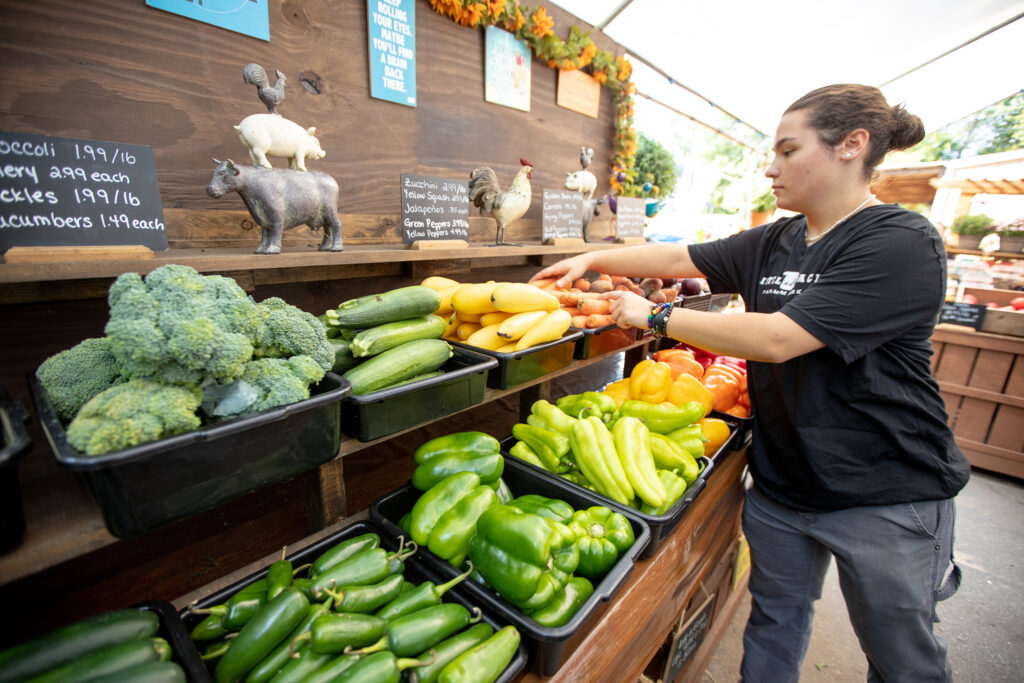
By preparing dishes with seasonal fruits and vegetables, you’ll be able to purchase the freshest possible produce. These fruits and vegetables carry higher levels of nutrients compared to out-of-season foods, which spend more time in transport and storage.
Planning meals with in-season items allows you to pick up most — if not all — of the necessary ingredients at the farmers’ market. However, you should also allow some flexibility in your meal planning in case your preferred produce is not available, or if you find something new you want to try.
Learning from CT Grown farmers
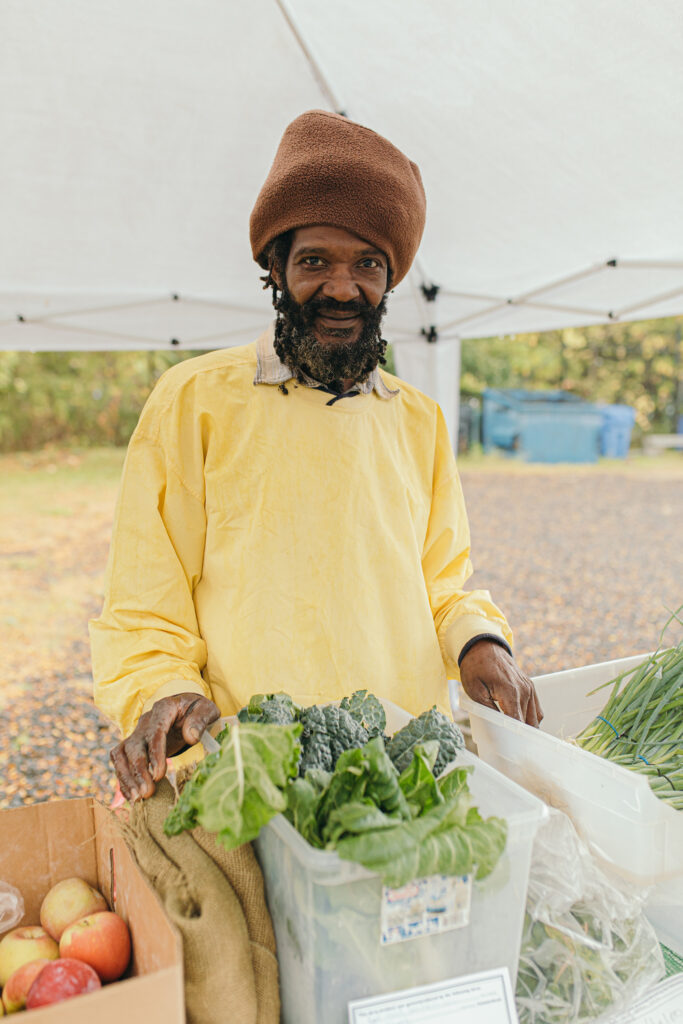
One major benefit of attending a farmers’ market is the ability to talk directly to the farmers who produced the food for sale. They can answer any questions about the items they’re offering and share tips on how fruits and vegetables should be prepared. Some farmers take the extra step of providing recipes that use items available from their farm.
Farmers’ markets often feature unfamiliar fruits and vegetables, or varieties that might not be available in stores. Farmers may offer samples of these goods so you can see if you’re interested in doing a full recipe with them.
Farmers’ markets are also a great place to discover specialty items that you may not realize are produced in Connecticut. Some lesser known CT Grown products include kiwiberries, emu and bison meat, persimmons, chokeberries, horseradish, chicory, and watercress.
How farmers’ markets can save you money
One common misconception about farmers’ markets is that they are considerably more expensive than shopping at the grocery store, making them accessible only to higher income individuals. In fact, several studies have shown that farmers’ market prices are comparable to those at retail locations. Farmers may lower their prices if they have a larger than expected harvest, or if their transportation costs are lower because a market is located close to their farm.
Other ways farmers’ markets can save you money include:
Reduced food waste: Farmers’ markets give you more choice over how much of a particular product you want to buy. Instead of purchasing a large container of tomatoes and watching half of them rot away, you can select a smaller quantity and easily use it up.
Longer lasting produce: Since the food you purchase at the farmers’ market has been harvested recently, it will last longer when stored properly. You can also look for “whole vegetables” — produce that hasn’t been trimmed back to improve its appearance — since they’ll have a longer shelf life.
Bulk purchases: Farmers’ markets offer the option of purchasing bulk quantities of a wide range of CT Grown goods. Farmers can also offer you tips on how to store, can, or freeze produce to keep it from going to waste.
Cash purchases: While smartphone apps are making it easier to accept credit cards, many farmers prefer to limit their farmers’ market transactions to cash only. This allows them to avoid paying a credit card fee, which in turn means the expense is not passed on to you.
Ugly produce: Plenty of fruits and vegetables don’t end up looking glamorous when they’re harvested, but are still perfectly good to eat. Since they’re less presentable, though, farmers are often willing to sell them at a discounted price. They’re also likely to cut prices on very ripe produce, which needs to be used as soon as possible, to keep it from going to waste.
End-of-day discounts: When the farmers’ market starts to wind down for the day, vendors may begin lowering prices to try to sell their last items. However, check the market rules first; some markets have rules prohibiting this practice, and haggling is also discouraged.
Using food assistance at the farmers’ market
The Connecticut Department of Agriculture strongly encourages people who receive Supplemental Nutrition Assistance Program (SNAP) benefits to use them at farmers’ markets. Most markets accept these benefits, allowing them to be used for the purchase of fruits, vegetables, cut herbs, and honey. Some markets help these benefits go even further by doubling benefits for fruit and vegetable purchases.
The Farmers’ Market Nutrition Program (FMNP) is a seasonal benefit allowing recipients to purchase fresh fruits, vegetables, fresh cut herbs, and eggs only at farmers’ markets. Seniors may also use benefits to purchase honey in addition to the other products listed. FMNP is open to all WIC participants as well as seniors over the age of 60 who meet income eligibility requirements.
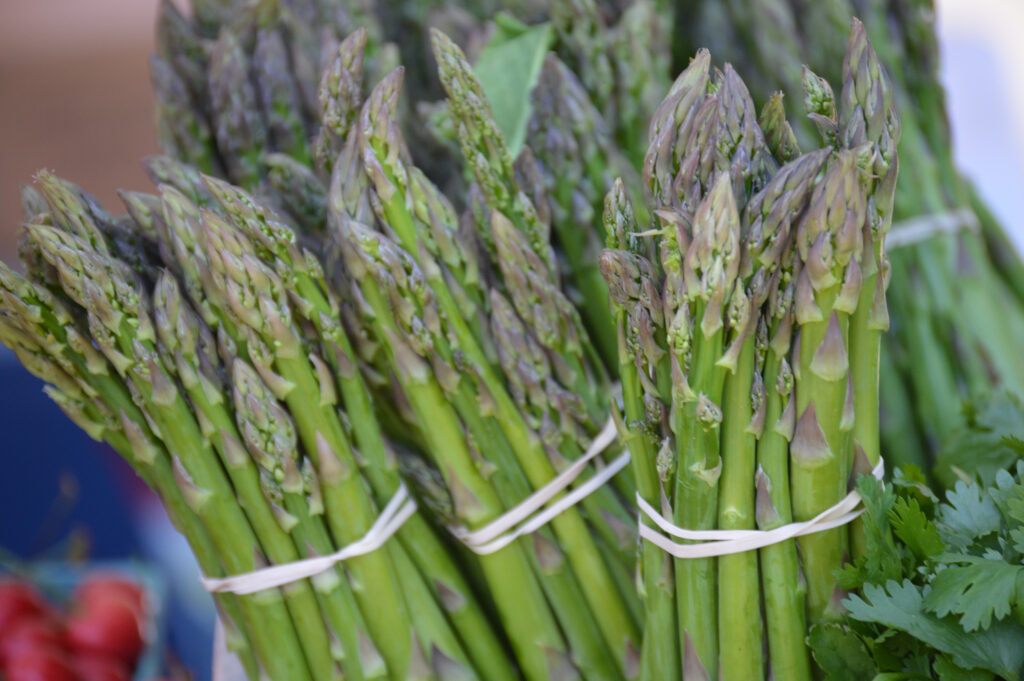
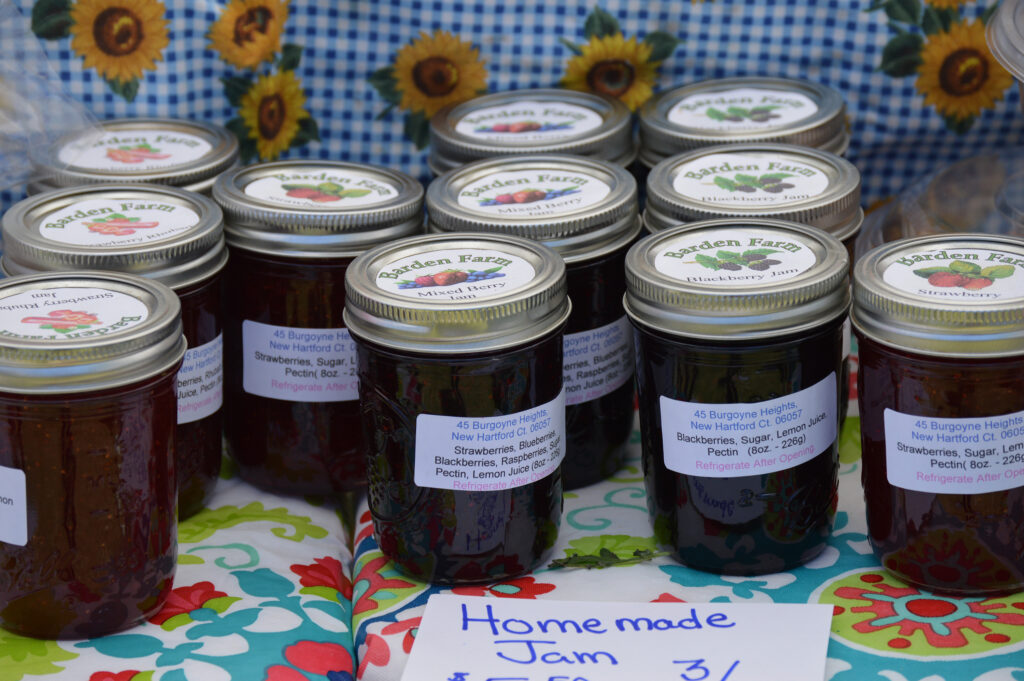
This year, Connecticut is transitioning its FMNP to provide electronic delivery of benefits. This will help make benefits more efficient for all participants and to increase the use of FMNP benefits. Participants can access benefits using a simple mobile app, or continue to use a physical card if they prefer.
To find a market that accepts your benefits, visit Farmers Markets (ct.gov)
Farmers’ markets to check out in Connecticut
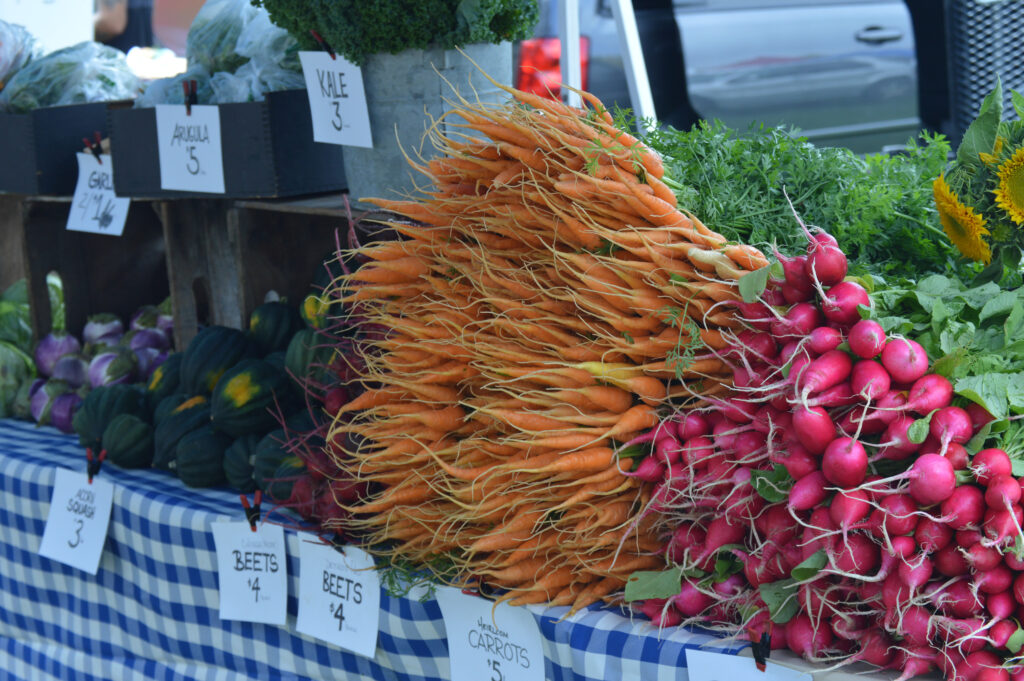
The Bridgeport Farmers Market Collaborative: Set up to help prevent nutrition insecurity in Bridgeport, this collaborative oversees nine farmers’ markets throughout Connecticut’s largest city. In addition to regular benefits, the markets accept vouchers called “Bridgeport Bucks” that are sponsored by local businesses.
Chester Sunday Market: Every Sunday during the summer and fall, Main Street in Chester is transformed into an open air market featuring local farmers and crafters. Organizers also set up a community tent to showcase local organizations and share numerous recipes for visitors to explore.
CitySeed: This organization runs three summer markets throughout New Haven, with a focus on seasonal produce native to Connecticut. More than 50 vendors take part in these markets.
Coventry Farmers Market: One of the largest and best known farmers’ markets in Connecticut, this market is held on the historic Nathan Hale Homestead. The market places a strong emphasis on education, with programs changing each week.
Hartford Regional Market: For early birds only! Running on weekend mornings from 6 to 9 a.m., this market’s vendors concentrate on floriculture products like bedding plants and hanging baskets, but one can also find fruits and vegetables in season and fall products such as pumpkins, gourds, and mums.
Litchfield Hills Farm-Fresh Market: The goal of this farmers’ market is to provide access to local, sustainable food systems. The market regularly features special guests including chefs, artists, musicians, and local nonprofits.
NECT Farmers Market: This organization, which has been active since 1980, organizes four market locations in northeastern Connecticut. Originally focused on providing locally grown fruits and vegetables, the markets’ offerings have expanded to include products like meats, soaps, pickles, and handcrafted items.
Niantic Farmers Market: Each week, this farmers’ market in southeastern Connecticut brings in a set of regular vendors as well as guest vendors. It also features a rotating schedule of food trucks and special activities.
Westport Farmers Market: Paul Newman was one of the founders of this market, and a frequent shopper there as well. The market is also unique in how it supports several programs covering everything from growing your own food to supplying CT Grown ingredients to local schools.
Willimantic Farmers Market: The longest running farmers’ market in Connecticut, this event has been providing fresh local food to the community since 1976. Vendors feature products like fruits, vegetables, and honey as well as specialty items like bakery products.
For more summer farmers’ markets, visit the CT Grown events calendar.
